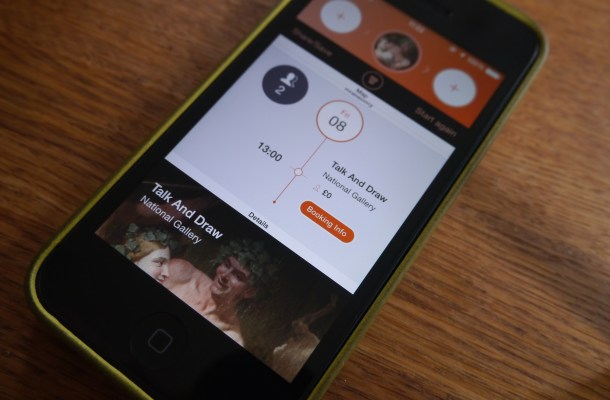There’s no shortage of startups making apps to help you find something to do in select cities. Apps like last minute event planner YPlan. Or YC-backed Shoobs if you’re after local nightlife events. Or, for tourists wanting to book excursions and tours on their city break, there’s GetYourGuide.
But what if you want to chain together a sequence of activities — say something cultural, dinner and a movie — rather than just booking one thing to do? That’s where Timista sees a gap in the market for its multiple event planning app.
The idea is to offer something akin to a pocket concierge service, with the app being smart enough to figure out which events can be realistically chained together, based on their proximity, availability and timings — so things like how long it takes to walk between them.
The startup started life as a side project, while its co-founder Pierre-Jean Camillieri was still at his day job in marketing at Apple. A prototype web version launched in 2012, with Camillieri quitting his role at Apple to go full time on the project in early 2013. An iPhone app launched at the end of last month — with an initial focus on London. The team has been bootstrapping development thus far.
Along with Camillieri, the other co-founder, Julien Bieren, works as a structurer/quant in the City, heading up a team developing complex models for the financial market. This experience is something Timista draws on for the algorithms that power its recommendations.
“We found that there was no good way to answer a very common question: ‘We are free on Saturday, what can we do?’ in the same way a real concierge could,” says Camillieri, explaning the inspiration for Timista.
A “proper answer” to that question — such as a hotel guest might expect from a conceirge — would list multiple activities that are happening and check availability, and indeed offer combinations of activities that work well together to maximise free time, he argues.
“That’s what our smart planner app does. You just state your ‘constraints’ (when and where you are free) and it lets you curate optimised timelines of social events in London,” adds Camillieri.
Timista’s team has created a patented system to identify events going on in London, including schedules and real-time availability, and then uses “maths and artificial intelligence” to help the user find and combine multiple activities.
“We have more than 10,000 events and venues in the system, representing 1,000,000 time slots available per week,” says Camillieri. “It uses… genetics algorithms — a class of algorithms more often used in very complex applications including bioinformatics and NASA engineering to help you find and combine activities that work well together.”
“Timista is the only service using artificial intelligence techniques to help you plan your time out,” he adds. “Traditional competitors include publications such as TimeOut, Londonist etc. They are very exhaustive and they add great editorial value. Yet, they do not offer a ‘smart planning’ service and you, the user, still need to find your way in the content and organise your time yourself.
“Newer competitors include last minuters such as YPlan (and to some extent Groupon, Living Social etc). They make it extremely easy to book a limited set of activities, potentially with discounts. Yet, by design they are not exhaustive and you will miss some of the most exciting venues/events (that do not want to give away their inventory). In addition, they will not let you combine activities to create bespoke plans for you.”
To be clear, the Timista app currently only works for London, UK, but the team obviously sees potential to expand the concept to other cities in time. They also see potential to offer it as a b2b whitelabel service for hotels or travel companies to offer as a free service to their customers.
The business model for Timista is a “Kayak type of model”, says Camillieri, with it sidestepping revenue share on booking and taking money through affiliation instead — via partnerships with companies such as OpenTable, Livebookings and London Theatre Direct. So the idea is to be a meta search engine for a sequence of timely events.
That does mean users can’t book the activities they choose within the app — but rather are directed to various other websites to do so. Camillieri says the reason for doing this is to be “exhaustive” on venue choice — being as some venues don’t support bookings via third party apps. It also means it’s not taking any commission from users for using the service.
The app’s interface uses drag and drop to let users build an itinerary, with potential events displayed as circular thumbnails, and the nearer the top of the screen they are the more convenient an activity is likely to be — relative to your chosen location.
“Once you find something and you drag and drop it into your time line, the app will check availability for you and show it. If you tap on “+” in the timeline, either before or after the activity you have chosen, the app should list restaurants in the vicinity of the show, with availability at the right time and good reviews. The first proposals shown should be the most convenient: in the same area, with availability at the right time, and good reviews. And so on if you add a 3rd activity,” adds Camillieri.
It’s obviously early days for Timista, with its app just launched and only around 5,000 active users so far. The interface can also slow down at peak usage times, so there’s work to be done on building out robustness. Camillieri says the startup’s aim is to seek external funding once it’s built up some traction with the product.
The question is whether it can convince enough people to let its algorithm do the thinking when they’re planning their next day out in the smoke, rather than relying on friends’ suggestions and/or serendipity.
